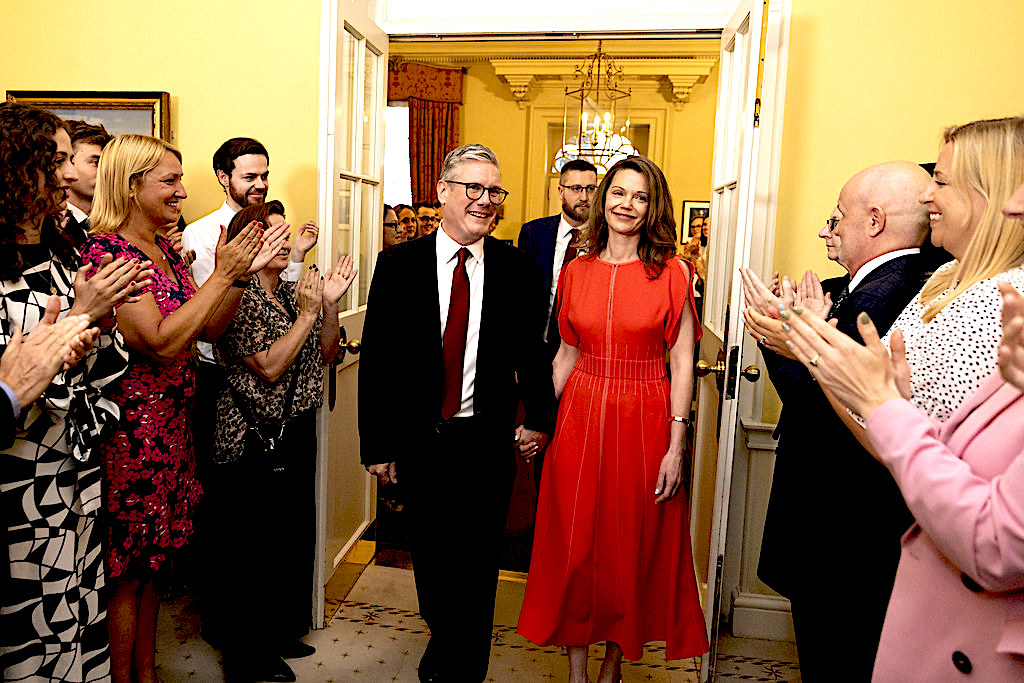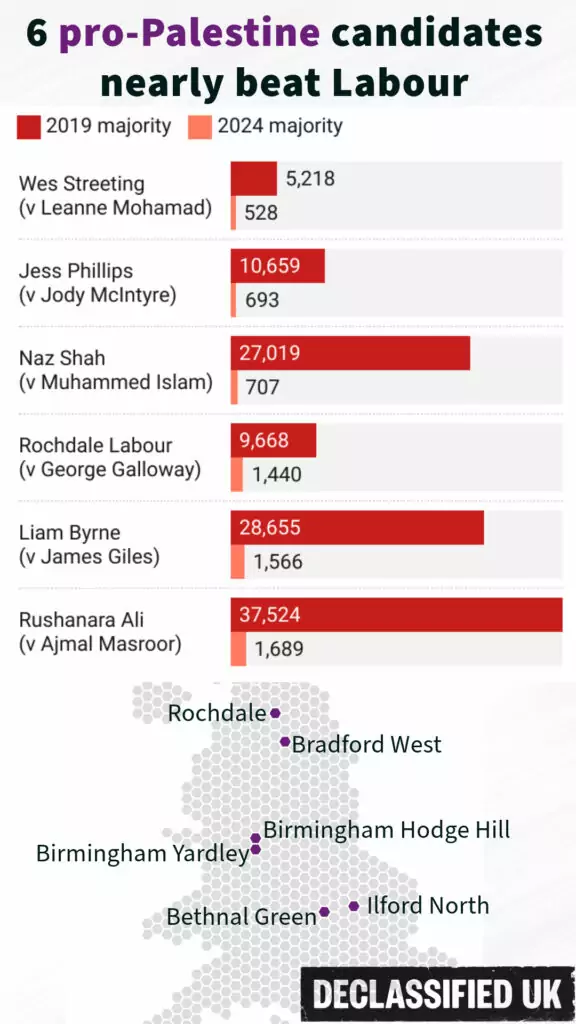Richard Sanders says voter support in the elections for Green, independent and Workers Party candidates represent a time bomb ticking beneath the new government’s majority.

U.K. Prime Minister Keir Starmer and his wife Victoria at Number 10 Downing Street on July 5, 2024, after winning the general election. (Simon Dawson / No 10 Downing Street, Flickr, CC BY-NC-ND 2.0)
By Richard Sanders
Declassified UK
The election of July 4 was a watershed moment.
For the first time significant space opened up on the two flanks of British politics.
Reform may only have won five seats, but they garnered 14.3 percent of the vote, prompting some to speculate we may be just a couple of elections away from the kind of results already seen in Italy and the first round of France’s parliamentary elections.
The principal beneficiary in terms of seats, though, was the left. The Greens won four while left-wing independents – including former Labour Leader Jeremy Corbyn – took five.
Between them and George Galloway’s Workers Party their share of the vote hit almost 10 percent.
In Bristol Central the Labour Party threw the kitchen sink at the contest — and they were right to. They still got thumped, with shadow culture secretary Thangam Debonnaire winning just 33 percent of the vote, to 53 percent for the Greens.
If Bristol Central can go Green, why not Bristol East, where the Greens got 31 percent; Bristol North East, where the Greens got 19 percent; Bristol North West, where they got 17 percent; and Bristol South, 25 percent? And if Bristol can go Green, why not other cities?

Analysis shows that in 2019 the Greens were second in just three constituencies. This has leapt to 40. In every single one of these seats – 18 of which are in London – it is Labour they are second to.
Independents or Workers Party candidates are now second to Labour in 17 constituencies, concentrated in areas with high Muslim populations in East London, Birmingham and Lancashire.
[See: Revolt in Northern England: No Ceasefire, No Vote – Consortium News]
In a number of these Labour only held on because the opposition vote split between the Greens and various independents.
That’s 57 constituencies where voters now know that a vote for the Greens or an independent is no longer an empty gesture but can have real impact.
In almost all of these seats the Conservative Party is irrelevant.
Hollow Victory

Starmer and Debbonaire campaigning on June 17 in Bristol. (Keir Starmer, Flickr, CC BY-NC-ND 2.0)
The Labour victory nationally was broad but extraordinarily shallow. A united right will undoubtedly win back swathes of rural and suburban seats. It will now find itself fighting on two fronts.
What’s remarkable is that this was entirely unnecessary.
Labour’s election strategy, outlined in the April 2023 document “Red Shift: Labour’s Path to Power,” was built on the assumption that what they called the “Activist Left” and “Centrist Liberals” could be taken for granted.
Their votes stacked up in huge majorities in urban constituencies. The priority was to focus on the “Patriotic Left” (essentially the Red Wall), and “Discontented Suburbanites.”
But Labour didn’t just neglect its traditional voters. The hyper factional young apparatchiks who surround Starmer went out of their way to goad, taunt and humiliate the left.
The deselection of mayoral candidate Jamie Driscoll in the North East in June 2023 was an early indicator of their vindictiveness, a trait seen at its most extreme in the gratuitous cruelty meted out to Faiza Shaheen.
She was deselected as Labour’s candidate after she’d begun campaigning in Chingford and Woodford Green.
So crass has the treatment of black and Muslim party members been that at times it’s hard to avoid the conclusion the party is positively leaning into the racist vote.

After 2019 the Left was prostrate and demoralised and had little appetite for a guerrilla war against the new leadership.
The brutality with which Corbyn and his followers were treated was performative. The aim was to curry favour with ordinary voters who strategists clearly believed loathed the left as much as they did.
The bald figures now prove them wrong, and dramatically so.
Shrinking Majorities
In 2019 voters firmly rejected Jeremy Corbyn. But in 2017 he’d obtained almost 13 million votes. Even in 2019 he obtained over 10 million, compared to just 9.7 million for Starmer this time around, on a sharply reduced turnout.
Standing under Corbyn’s banner, Starmer obtained 36,641 votes in his own constituency in 2019. This time it plunged to 18,884. Next door, in Islington North, standing as an independent, Jeremy Corbyn obtained 24,120.
It may seem fanciful to say this now. But Starmer’s hugely impressive independent opponent, former ANC MP Andrew Feinstein, could conceivably defeat him next time if he can reach an electoral agreement with the Greens.

Feinstein at the presentation of the documentary “Shadow World: Inside the Global Arms Trade” in Copenhagen, November 2016. (Mogens Engelund, Wikimedia Commons, CC BY-SA 3.0)
Wes Streeting, now health secretary and a possible successor to Starmer, only squeaked through against Leanne Mohamad — a young, British-Palestinian woman — and is desperately vulnerable.
And Faiza Shaheen, standing as an independent in Chingford and Woodford Green, was less than 100 votes behind the Labour candidate, splitting the vote and allowing arch-Conservative Iain Duncan Smith to retain the seat.
The Labour Party will point to Gaza as a one-off factor, accompanied by frankly racist insinuations that there is something sinister about votes motivated by this issue. But Gaza served to galvanise a broader discontent and alienation.
There is just one demographic which unquestionably buys into the Labour right’s self image as the grown-ups in the room — senior journalists for the London-based national media.
They and the centrist political establishment constitute a cosy club dangerously out of touch with the angry currents swirling around the U.K.’s body politic.
British politics and British journalism are in desperate need of generational renewal.
Richard Sanders is a film maker, journalist and author. He was producer of the second film in Al Jazeera’s Labour Files series, which looked at the antisemitism crisis.
This article is from Declassified UK.
Views expressed in this article may or may not reflect those of Consortium News.

So now we have the long awaited assassination attempt on Trump.
Recently BBC media hack Aaronovitch called for him to be murdered.
Trump should steer well clear of any grassy knolls.
hxxps://nypost.com/2024/07/02/world-news/bbc-presenter-calls-on-biden-to-have-trump-murdered/
The lowest turnout since universal suffrage was introduced. And Starmer’s vote more or less halved. A hollow victory and not really a landslide except in the alternate reality and ongoing disgrace that is the UK voting system. I hope Andrew Feinstein takes Sir Keith on again, and it’s sooner than later!
Discussions in parliament are likely to be more highly attended and more interesting now there will be some new articulate voices. Some in the US take umbrage at being called “articulate,” as in the seventies it was a faint-praise racist put-down, but maybe enough time has passed that it is ok to be adept with words. And swords, of course. How “activist” became a put-down, in days of gyms and coffee shops (uppers) is a mystic oxymoron-ish phenom to this old person. What, everybody is supposed to sit on a couch eating bob-bons?! Fat chamce.
Although I originally thought Nigel Farage joined the Reform Party late in the election to draw disaffected Tories away from voting Tory to let Starmer’s Labour Party win, I now think Farage was there to draw disaffected working class voters away from voting Independents to ensure the Labour Party would win. I consider Farage a political snake who enabled an unpopular and unwanted party to take power.
Yeah but, it hardly matters with a fixed electoral system. Labour, with 419 seats got only 34% of the vote, while Tory/Reform got 39%! Voting under these circumstances is a complete waste of time. The ToryLabour Parties control the entire system and are hardly likely to let go of their control giveb how their political existence depends on their control!
Such cynicism in someone so young!
How many years does the author envisage “just a couple of elections away” will take?
Liberally speaking, of course!
Sarcasm is the sine qua non for maintaining sanity, given the insane standards of the political realities that rule the day these daze!